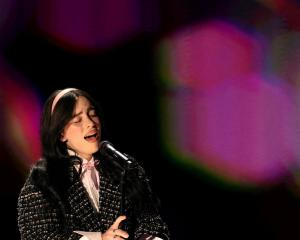Before every show, Brandon (12) styles his hair into a spiky mohawk like the one Durbin often sports. He also tapes his ears slightly forward, slips on several wristbands and hangs a shirt from the back of his pants to mimic the cloth "tail" favoured by the singer from Santa Cruz.
Before this year, Brandon had never watched American Idol. However, he considers Durbin to be "so awesome and cool" that his parents happily let him stay up past his bedtime to check it out.
Why the sudden fascination? Like Durbin, Brandon has Tourette's syndrome, the mysterious neurological disorder that triggers involuntary movements and/or vocal outbursts called tics.
The Idol contestant is the first person Brandon has come across with the condition.
"It's been like a coming-out party for Brandon," his mother, Malinda, said. "Before this, he found it really difficult to accept his Tourette's, or even talk about it. James has put a face on Tourette's and is showing Brandon that he can be comfortable with himself."
"I have Tourette's and Asperger's, but Tourette's and Asperger's don't have me," Durbin (22) said in an Idol interview earlier this season.
"I'm doing what I can to suppress it. It's not who I am."
Although awareness of Asperger's - a high-functioning form of autism - has increased in recent years, Tourette's remains a highly misunderstood disorder that spawns many misconceptions.
"In the rare cases where you see Tourette's in the movies and on TV, they tend to have fun with it," said Cynthia Sandoval (27), a Californian who was diagnosed with the disorder in middle school.
"It's usually some person shouting out curse words all over the place. It's a very tired image."
She treats patients with Tourette's. Much more common are symptoms that can range from mild tics such as blinking and facial twitches, to more complex movements that include head and shoulder jerking, repetitive throat clearing, hopping and grunting. The symptoms tend to wax and wane, and they often worsen during stressful situations.
"It's very annoying and embarrassing at times," Sandoval said. "It can totally take over your life."
The disorder, in severe form, affects an estimated 200,000 people in the United States, according to the Tourette Syndrome Association. It becomes evident in childhood or adolescence - a time when sufferers often experience teasing and ridicule.
"It can be really difficult for a child to have it out in public," Malinda DeVincenzi said.
Brandon was once the target of a schoolyard bully.
Most patients do not need medication, but drugs could be prescribed if the tics are extreme enough to interfere with daily activities. There is no cure.
"Some people mistakenly believe that it's a mental illness," Lyster said.
"But Tourette's does not adversely affect intelligence and brain function."
Nor does it seem to affect one's ability to rock the American Idol stage. Durbin might display signs of his Tourette's during on-camera interviews when he repeatedly squints and scrunches up his face. But as he told Idol viewers, when he sings, "it all just goes away, like I don't have a care in the world".
For Santa Cruz residents who knew Durbin when he was a shy, troubled and socially awkward teen, his Idol ascendancy has been a joy to behold.
"James has gained so much confidence over the years because his talent was always so well received," Robin Aronsson, who directed Durbin in two productions for the Santa Cruz-based youth theatre group, Kids On Broadway, said.
"People just rallied around him. He started to open up and calm down. He became a delightful young man."
Fans who have experiences with similar neurological disorders regard Durbin not only as an exciting entertainer, but a role model who can help raise awareness and change perceptions during his time on a television show seen by about 25 million people each week. Alisa Yaffa, leader of a Bay Area-based Tourette's syndrome support group, calls Durbin a "great influence".
"People are seeing that Tourette's has no effect on his talent - that it's not holding him back in any way," says Yaffa, a Menlo Park resident whose 11-year-old son Brian has the syndrome.
"That's a great message. It's something that gives parents hope, and their kids hope."
That hope is turning into fanatical support among many Northern California families touched by Tourette's. Caitlin Johnston, of Felton, had her third-grade son send Durbin good-luck wishes on Facebook, and the two of them - also first-time Idol watchers - phone in plenty of votes for Durbin after every show.
"I feel like I'm voting for my own kid," said Johnston, who did not want to reveal her son's name.
"I know that sounds ridiculous, but it's not."
Meanwhile, Durbin has become a "superhero" in the eyes of Danilo Pugliese, an 8-year-old resident of El Granada, California, who was diagnosed with Tourette's just four months ago. According to his mother, Danette, the boy is so hooked on Durbin's Idol tunes that he repeatedly belts them out "at the top of his lungs" in the car and around the house.
"James has given our son a sense of validity - some reassurance that [Tourette's] isn't just a random curse that only affects him," she says. "He could not have come along at a better time."
TOURETTE'S FACTS
• Tourette's syndrome is taken from the name of Georges Gilles de la Tourette, a French neurologist who successfully assessed the disorder in the late 1800s.
• Tourette's typically first appears in early childhood and can worsen in pre-teen years. Symptoms can disappear for weeks or months at a time.
• Males are affected three to four times more frequently than females.
• The cause has not been established, although research indicates that Tourette's stems from the abnormal activity of at least one brain chemical (neurotransmitter) called dopamine.
• Notable people with Tourette's syndrome include former NBA player Mahmoud Abdul-Rauf, former Major League Baseball player Jim Eisenreich, jazz pianist Michael Wolff and USA World Cup goalkeeper Tim Howard.
Source: Tourette Syndrome Association












